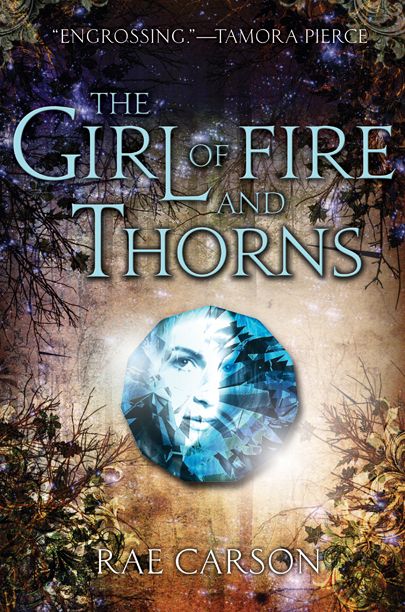Apologies this is late folks, between some work going much later than I thought last night and the worst headache I've had in a month there was no way this was going up until after midnight and even if it did go up it wouldn't be very coherent in places. Since my schedule was a bit strange last week anyway I'm also going to push Sunday and Monday's regular reviews back a day and hopefully make them even better than usual with the extra time!
I read so many book reviews these days (or at least, see the blog post titles for them) that I tend to confuse an awfully large number of books with each other. Occasionally these mix-ups make sense and sometimes they don't, my confusing this book (a low-fantasy in a setting that looks like Spain) with some dystopian title or another falls into the later category.
The Girl of Fire and Thorns by Rae Carson
When Elisa was young she was marked for greatness when god put a stone in her naval, a symbol that she would one day do a great service for him, but she often wonders if she was a mistake. The second princess in her kingdom, she's surprised when she's married off to a neighboring king and quickly learns that god has a plan for her after all and that it's not going to be an easy one.
As noted, this book is about as far away as you can get from the dystopia genre, which in and of itself was a nice surprise, and I was also surprised to see a set-up I rather like crop up; taking the young but well-meaning protagonist and then having their experiences groom them into becoming a good ruler, it even happened in a desert!* I also prefer (and feel like the story is more believable) when the character is already a likable, generally good person before this transformation, which is what Elisa is. She's young, aware that she's a bit naive about the world (and finds out later that there has been a conspiracy around her to keep her that way), a nice person, and while she is marked for greatness it's not the kind of power that one can use to just solve a problem more easily. Although that is where I had the most troubles with the book, the book ends with a deus ex machina and felt rushed right in the last fifth, maybe even just the last tenth, of the book to get to that point. Considering the careful pacing of the book up until that point, and it was pacing itself as if it was a trilogy, the sudden ending which seemed to tie up all the plot threads really threw me off and I had to actually look for outside material to tell me if this was part of a series or not (the answer is yes by the way which makes this ending all the stranger).
To speak of other things that felt a bit odd in the book, Elisa's appearance. She's overweight and loses weight and sounds like she still has a naturally curvy figure which I did like, I like coming across main characters who have a variety of body types. However, the book wasn't always consist about her body which did niggle at me, she loses weight after going through a very punishing trek through the desert yet later it sounds like if she had just eaten less and exercised more she could have lost that weight all along (and the amount she did lose, their was a line about her nightgown now billowing around her which also struck me in a bad way). In this world there are a variety of both body types and metabolisms, so while I could believe that Elisa is simply a person who gains weight easily there was just something about how the book showed her that felt off to me (I'll note that I'm not curvy myself so perhaps larger people will feel that she's actually a rather accurate representation, at which point I will concede to their real world experiences instead). She does acknowledge that she had some bad habits however, that eating all the time certainly hadn't helped, so that did help it. I also felt that her husband didn't quite have enough screen time to feel like a fully fleshed out character, yet I did like the contrast between his public and private appearances.
And finally, as a brief note, I did like that for once I've found a story where the religion in it is certainly based on Christianity but it doesn't just borrow a symbol here, and a passage there and call it a day (anime I am looking at you). I remember that I also liked how Seraphina did this, although they had a completely different approach, and combining that with the desert created a really interesting setting. Between that setting and Elisa's character I did really enjoy the book and recommend it, but it has more than a few rough patches along the way.
*no really, I can think of more than a couple of stories, such as The Blue Sword, which do this exact thing in a desert so I found that amusing.
